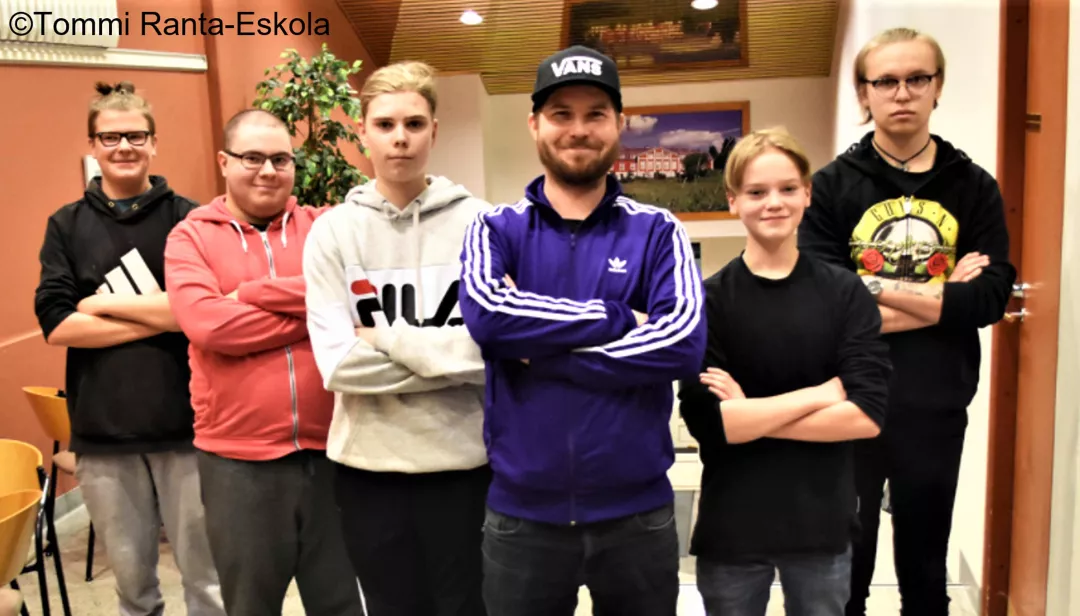General information
RDP Priority
- P6. Social inclusion and local development
RDP Focus Area
- 6C: Information & communication technologies (ICT)
RDP Measure
- M07: Basic services & village renewal
Summary
The Haapavesi Civic School’s ‘Esport Academy’ project offered young inhabitants of the Northern, sparsely populated Haapavesi municipality new opportunities to learn about the Esports industry. A targeted marketing campaign invited young people aged 15-20 to sign up to the ‘Esports Academy’ and train to become resident gamers on the team. A programme of coaching and development helped them to improve their gaming, physical skills, and team dynamics.
Results
The project has increased awareness regarding the Esports industry and the leisure and social opportunities of Esports within the target group of 15–20-year-olds.
The Esport Academy team members have improved their gaming, physical and social skills. Their outlook seems much clearer and brighter.
The project has also improved cooperation between Esport related educational institutions in the North Ostrobothnia region, who will continue to offer a joint programme of study trips.

Promoter
Haapavesi Civic School (Haapaveden Opisto)
Funding
Total budget 90 489.00 (EUR)
EAFRD 30 400.50 (EUR)
National/Regional 41 981.65 (EUR)
Private 18 106.85 (EUR)
Ressourcen
Documents
Esport Academy in Haapavesi
(PDF – 2.85 MB)
Links
Context
‘Esports’ (Electronic sports) is a term covering a wide range of competitive sports using information technology. Esports is a billion-dollar industry and it typically involves organised, multiplayer videogame tournaments between individuals or teams of professional players. Such competitions now attract large audiences, both in-situ and via streaming. As with any field of competitive play, there is a role for professional coaching. In Esports coaching, technique and strategy are addressed alongside physical and psychological well-being, as these factors intertwine. As a growing global phenomenon with a huge youth following, Esports is creating new kinds of social and economic networks, both on a local and international level.
The Haapavesi municipality in the North Ostrobothnia region of Finland has a lot of 15-20-year-old young residents. These include those who either study in secondary schools or who are no longer in the education system. This demographic is particularly interested in virtual gaming and devote a lot of time to it. It can be very useful to support and guide gamers in ways that helps young people to achieve a productive, healthy and balanced lifestyle as part of the digitalising world.
This project was supported through the Keskipiste LEADER LAG, which is one of the forerunners of youth inclusion and participation among the Finnish LAGs and rural development actors.
Objectives
The project aimed to offer youngsters new opportunities to learn about the Esports industry, as well as new guided game activities. The goal was to validate and develop their interests while supporting them to continue skills development and studies in their rural locality. At the same time, the project hoped to improve the area’s attractiveness from the perspective of young people, by building a community network of like-minded friends.
Activities
The project started in 2019 with the recruitment of the project manager. It wasn’t easy to find such a highly skilled and experienced person in a rural area, especially considering that the field is still relatively new, but luckily such a person was found from among the few job applicants.
In February 2020, the new Esport Academy was launched in connection with the Haapavesi Municipal Civic School. The first actions were concerned with planning, marketing, networking and launching the youth gaming groups. At the same time, the COVID-19 pandemic reached Finland, and the gaming events and courses had to be limited to online only. 30 youngsters participated in the activities before the summer.
In autumn 2020, a marketing campaign was launched targeting local school students. Out of around the 210 young people reached, six applied to become ‘academy gamers’ on the first Esport gaming team of the academy. In the Autumn, they practiced different games together and took part in physical tests and training. In December, the team participated in their first online Esport tournament.
In 2021, the marketing campaign was repeated and the first girl joined the team, which by this point had eight players. Individual and group gaming skills were improving a lot and in the final event in 2022, both the youngsters and their parents gave very good feedback on the Academy’s activities.
Main results
The project has also improved cooperation between Esport related educational institutions in the North Ostrobothnia region, thanks to which a programme of study trips - to Vuokatti-Ruka Sport Academy and Kajaani Vocational School – was organised. At the request of the project participants and their parents, the network of educational institutions will continue to offer similar content in the future.
Key lessons
Esports are a new and growing opportunity that can be applied to involve young people in different aspects of rural development including employment, training, and networking.
The pandemic pushed much of the training and meetings online, but for the target group and Esport team members this was not really a problem because they were already spending a lot of time online before the pandemic. The most important thing was that they were meeting online to play and learn together as a group.
